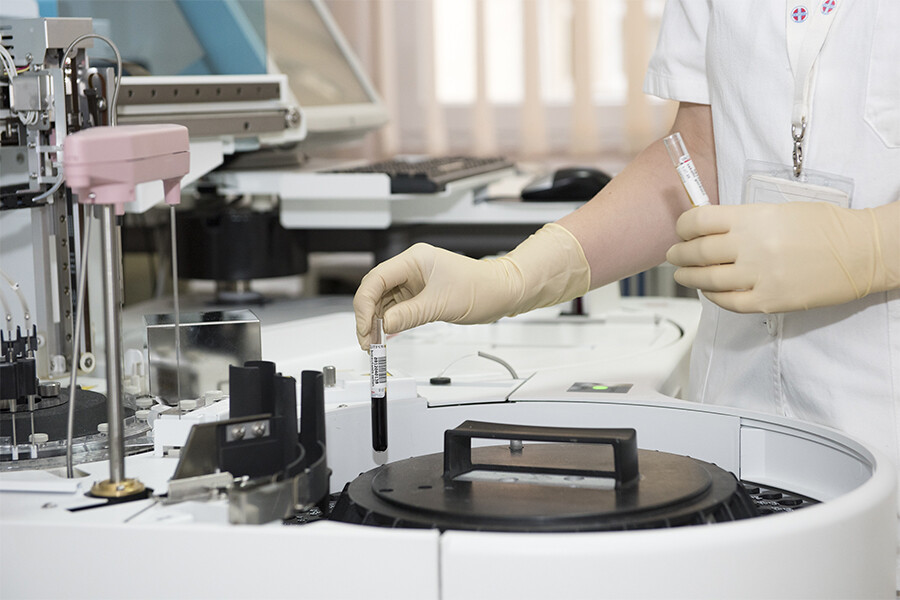Lab tests that impact lives: harmonizing critical values

Genetic testing is a growing area of medical research and diagnostics. From predicting health outcomes and hereditary conditions to precision medicine (particularly in cancer diagnosis and treatment), it is a vital part of the future of healthcare. A team at the University of Toronto has just published the first study of Ontario genetics laboratories' practice of reporting critical values to help define standards for the industry.
Critical values are “a laboratory test result that represents a pathophysiologic state at such variance with normal as to be life-threatening unless something is done promptly and for which some corrective action could be taken” (Lundberg 1972). In other words, it is a test result that triggers immediate action to save a patients’ life such as a prophylactic mastectomy when there as a high risk of breast cancer, or is very unexpected and needs exploration, such as a pathogenic variant identified in a fetus.
As with all laboratory testing parameters, there is currently no harmonization across Ontario: each laboratory runs independently. Although all adhere to strict quality and safety standards, there may be some deviation from lab to lab in how they classify tests or raise the critical value ‘alarm’.

The LMP Quality Council is a group of experts from many fields of laboratory medicine, representing the major hospital laboratories across the Greater Toronto Area (GTA). Together they aim to “promote alliances between the hospitals affiliated with the University of Toronto to develop novel quality programs or initiatives that will enhance patient care” and to harmonise clinical laboratory results across the GTA. They want to reduce waste and increase efficiencies in testing, and above all, enhance patient care, so that no matter what laboratory is processing your test, the patient will receive a similar result done to the same standards.
Dr. Elaine Goh is Division Head of Clinical Genetics, Trillium Health Partners and Assistant Professor in the Department of Laboratory Medicine and Pathobiology (LMP) at the Temerty Faculty of Medicine, and a member of the LMP Quality Council.
Representing the field of genetic testing on the Quality Council, she and her colleague Dr. James Stavropoulos, Clinical Lab Director of Genetics at The Hospital for Sick Children, have just published the Council’s first peer-reviewed paper.
- Read the paper: Defining and Reporting on Critical Values in Genetics: A Laboratory Survey in the Journal of Applied Laboratory Medicine
The team surveyed genetic laboratory directors across Ontario to understand what they considered critical test results to be in areas such as cytogenetics, molecular genetics, maternal marker screening, and biochemical/metabolic genetics. They also asked directors to describe their reporting processes, for example, how do they communicate with patient-facing clinicians when they discover a critical value?
The first study of Ontario genetics labs, they had an 82% response rate, receiving interesting insights into genetic testing in the province, which is the basis of the paper.
One example is in patient types. Critical values in other fields, such as heart attacks, elevated troponin levels (proteins released when the heart muscle has been damaged) may be the critical value – regardless of who the patient is. However, in genetics, the type of patient being referred for testing appears to be important. 78% of the laboratories would expedite prenatal patients and 44% of laboratories would expedite newborns. 67% of laboratories would expedite the test if the ordering physician requests it. This makes sense as some genetic test results can take three-four months to return. If you have a risk in pregnancy that affects the fetus, such as potential Downs Syndrome, this can be a matter of urgency for the family.
“Critical values in molecular genetics and cytogenetics have not been clearly defined,” commented Dr. Goh. “This study helps us advance that definition which can highlight important results to be flagged for clinical care. There is a real benefit in standardizing processes. You want to be able to provide the same level of care, wherever that patient is located. From a laboratory perspective, you want to have simple processes and to know that you are held up to the same reasonable quality standards and expectations on turnaround (time)s. As a patient, I would want to make sure my care isn’t dependent on which doctor I see, or who is looking at my tests.”
Goh presented the study at the Council’s inaugural event earlier this year: you can view a recording on our website.
With each project, the Council aims to disseminate results and produce guidelines they hope laboratories will implement across the province. The Council is looking at many ways to harmonize laboratory standards in all the lab disciplines, from looking at quality indicators to lab test utilization and critical values in other areas of Lab Medicine.
There is an urgent need to harmonize quality standards and indicators across laboratories locally and worldwide. Having more standardization and harmonization will allow laboratories to benchmark themselves and see where their processes require improvement. We hope to enable this and ultimately ensure that patients receive the best quality care possible.Dr. Khosrow Adeli, Vice-Chair of Quality in LMP
More information
- The Quality Council website: Clinical Laboratory Services
- View Dr. Goh’s presentation on the project page: Harmonization of Critical Values for Laboratory Tests
- Subscribe to our mailing list to hear more about the Quality Council projects and events



